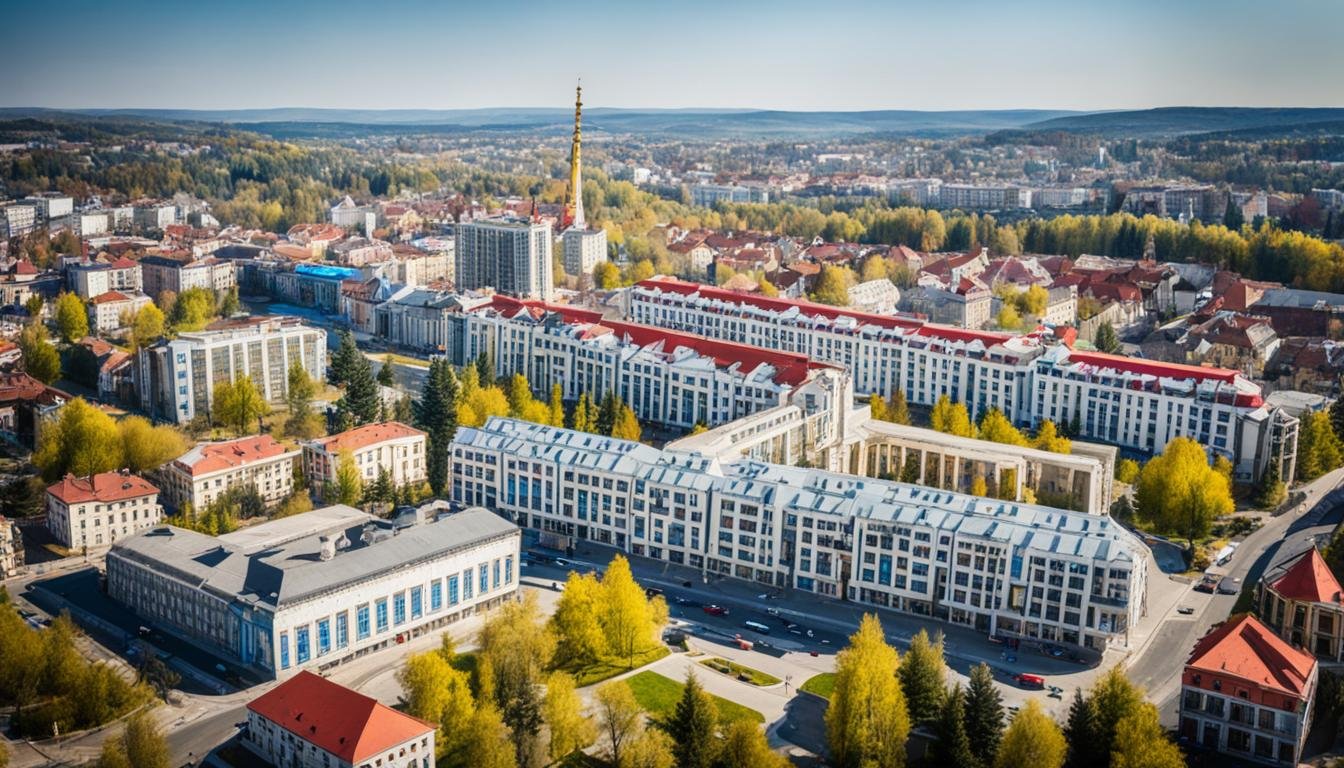Tucked away in the heart of Eastern Europe, Moldova has endured a remarkable economic and social transformation since the collapse of the Soviet Union. In the past decade, the country’s GDP has plummeted by over 60%, reflecting the severe challenges it has faced during this transition. This article delves into Moldova’s journey, exploring the complex dynamics of its transition from a post-Soviet state to a nation striving for democratic governance and European integration.
Key Takeaways
- Moldova’s transition from the Soviet era has been marked by external debt, foreign trade imbalances, political and institutional development challenges, social effects, and the need for outside assistance.
- The country’s economic performance and living standards have declined significantly, with GDP falling by over 60% within a decade.
- Chișinău, the capital city, has become a hub for Eastern European transition studies, as researchers and policymakers explore Moldova’s complex journey.
- Moldova’s transition is shaped by its unique geopolitical dynamics, including its close ties with Romania and its position between the European Union and Russia.
- Understanding Moldova’s transformation is crucial for developing effective policies and assistance programs to support the country’s continued development and integration into the European mainstream.
Moldova’s Economic Transformation
Agriculture has long been the backbone of Moldova’s economy, playing a pivotal role during the country’s transition period. The development of agricultural production, the emergence of a new private sector, and the challenges faced by the industrial sector have all been instrumental in shaping Moldova’s economic transformation.
Agriculture: The Backbone of Moldova’s Economy
The agricultural sector in Moldova has undergone significant changes over the years, with farmers embracing new technologies and adopting innovative practices to boost productivity. The privatization of land and the creation of a thriving private sector have been crucial in revitalizing the agricultural industry, making it a reliable source of economic growth.
Industrial Sector: Challenges and Privatization
The industrial sector in Moldova faced significant challenges during the transition, including the need for privatization. The report examines the progress and obstacles in restructuring the industrial sector, as well as the development of rural enterprises. Ensuring a smooth transition and effective privatization has been crucial for the industrial sector’s growth and competitiveness.
The Crippling Energy Crisis
The energy sector has been an Achilles’ heel for Moldova, with the country facing a crippling energy crisis that has had far-reaching implications for its economic transformation. Addressing the energy crisis and securing reliable energy sources have been critical priorities for the government, as they strive to foster sustainable economic development.
External Trade Imbalances and Debt Burden
Moldova has grappled with significant external trade imbalances and a growing debt burden during its transition to a market economy. Despite efforts to diversify its export markets, the country has struggled to reorient its foreign trade away from its traditional reliance on the Russian market. This failure to successfully reshape its export orientation has exacerbated Moldova’s external imbalances and contributed to its burgeoning debt.
Impact of the Russian Crisis on Foreign Trade
The Russian crisis of the late 1990s had a significant impact on Moldova’s foreign trade. The economic turmoil in Russia, a major trading partner, disrupted Moldovan exports and led to a sharp decline in trade volumes. This, in turn, widened Moldova’s trade deficit and put additional strain on the country’s balance of payments. The Russian crisis also had a detrimental effect on Moldova’s debt burden, as the economic downturn reduced the government’s ability to service its foreign obligations.

Failure to Reorient Exports
Moldova’s inability to successfully reorient its exports has been a persistent challenge. The country has struggled to diversify its export markets and reduce its reliance on the Russian Federation, which has remained a significant destination for Moldovan goods. This failure to broaden its export base has inhibited Moldova’s ability to address its trade imbalances and manage its debt burden effectively.
Moldova’s Political and Institutional Development
Moldova’s political and institutional development during the transition period has been a complex journey. The country’s early detachment from the Soviet Union was followed by a brief civil war, which tested the resilience of its fledgling political institutions. However, despite these challenges, Moldova has managed to maintain relatively harmonious inter-ethnic relations, which has been an important factor in its political and institutional development.
Harmonious Inter-Ethnic Relations
One of the notable achievements during Moldova’s transition has been its ability to foster harmonious inter-ethnic relations. Despite the challenges of the transition, Moldova has managed to maintain relatively harmonious inter-ethnic relations, which has been an important factor in its political and institutional development. This has played a crucial role in the country’s efforts to establish democratic governance and move towards political pluralism.
Early Detachment and Civil War
The early years of Moldova’s independence were marked by a challenging transition. The country’s detachment from the Soviet Union was accompanied by a brief but intense civil war, which tested the strength of its political institutions. This period of political and social upheaval presented significant hurdles to Moldova’s political development and institutional reform. However, the country’s resilience and the efforts to maintain harmonious inter-ethnic relations have been instrumental in navigating these turbulent times.
The Public Sector in Crisis
Moldova’s public sector has faced significant challenges during the country’s transition period. The government has struggled to fulfill its debt obligations, leading to a financial crisis that has put immense pressure on the nation’s fiscal stability. The public sector’s ability to provide essential services has been severely compromised, as the country grapples with the burden of servicing its mounting debt.
The public sector’s fiscal challenges have been further exacerbated by the need to address the lingering effects of the Russian crisis, which impacted Moldova’s external trade and economic growth. This has placed a heavy strain on the government’s resources, making it increasingly difficult to allocate funds for vital public services and infrastructure development.

Addressing the public sector’s crisis has become a pressing priority for the Moldovan government. Reforms aimed at improving financial management, enhancing revenue collection, and optimizing spending are crucial to restoring the public sector’s ability to fulfill its responsibilities and provide a stable foundation for the country’s economic and social development.
Moldova: Eastern European Transition Studies Chișinău Moldova
As the capital of Moldova, Chișinău has been at the epicenter of Eastern European transition studies. The city has provided a unique vantage point to observe and analyze the complexities of Moldova’s post-Soviet transformation. Scholars and researchers from around the world have flocked to Chișinău to delve into the nuances of this Eastern European transition, seeking to understand the country’s economic, political, and social evolution.
Moldova’s journey from a Soviet republic to an independent state has been a profound and multifaceted process, and Chișinău has been the hub where these transformations have unfolded. The city’s institutions, think tanks, and universities have played a pivotal role in facilitating the study of Moldova’s Eastern European transition, providing a wealth of data, analysis, and insights that have informed both academic discourse and policymaking.
Researchers focusing on Chișinău and Moldova studies have shed light on the country’s economic restructuring, the challenges of privatization, the impact of the Russian crisis, and the complexities of political and institutional development. These insights have proven invaluable in shaping a deeper understanding of the broader Eastern European transition narrative.
The Social Drama: Plummeting Living Standards
The transition period in Moldova has been marked by a severe social impact, with declining living standards for the majority of the population. The country has grappled with the mechanisms behind this fall, including soaring inflation, sharp declines in wages and other forms of income, and the collapse of the public social security system.
Income Inequality and Consumption Patterns
The transition has also led to significant changes in income distribution and consumption patterns, with growing income inequality and challenges in accessing medical care and education. As the economy has restructured, some segments of the population have benefited more than others, widening the gap between the haves and the have-nots. This has resulted in uneven access to essential services and resources, further exacerbating the social drama unfolding in the country.
Mechanisms Behind Falling Living Standards
The fall in living standards can be attributed to a combination of factors, including the rapid privatization of state-owned enterprises, the restructuring of the industrial sector, and the ongoing energy crisis. These changes have disrupted traditional employment patterns and eroded the social safety net, leaving many Moldovans struggling to meet their basic needs.
Comparing Moldova’s Transition with the Baltic States
As the world witnessed the fall of the Soviet Union, the Baltic states and Moldova embarked on their own distinct economic transition journeys. While the Baltic countries – Estonia, Latvia, and Lithuania – experienced a relatively smoother and more successful transition, Moldova faced a more arduous path.
The Baltic states, with their strategic location and strong historical ties to Western Europe, were able to quickly reorient their economies towards the European Union market. This allowed them to capitalize on foreign trade and investment, driving rapid economic growth and development. In contrast, Moldova struggled to break free from its reliance on the former Soviet bloc, leading to a prolonged economic stagnation and a widening trade deficit.
The differences in economic performance between Moldova and the Baltic states are striking. The Baltic countries have consistently outpaced Moldova in key indicators such as GDP per capita, foreign direct investment, and export diversification. This disparity highlights the importance of factors like geopolitical positioning, institutional strength, and policy decisions in shaping the trajectory of economic transitions.
The comparative analysis of Moldova’s and the Baltic states’ transitions offers valuable lessons for future assistance and development efforts. Understanding the nuances of each country’s journey can inform more effective and tailored support strategies, ultimately benefiting economies in transition and enhancing their long-term resilience.
Lessons for Future Assistance and Development
The transition process in Moldova has been marked by significant complexities and challenges, underscoring the need for a more nuanced approach to development assistance and interventions. The report emphasizes the importance of understanding the intricacies of the transition, as well as the timelines, relevance, and appropriateness of any proposed strategies.
Understanding Transition’s Complexity
The Moldovan transition has been anything but straightforward, with a myriad of economic, political, and social factors intertwining to create a multifaceted landscape. Development strategies must account for this inherent complexity, tailoring interventions to the specific needs and circumstances of the country.
Timelines, Relevance, and Appropriateness
The report stresses the significance of considering the timelines, relevance, and appropriateness of transition assistance and interventions in the Moldovan context. The transition process has been characterized by significant challenges and setbacks, and any proposed solutions must be carefully evaluated to ensure they align with the current realities and needs of the country.
By adopting a more nuanced and context-specific approach, future development strategies can better address the unique challenges faced by Moldova during its transition. This will be crucial in supporting the country’s path towards sustainable economic and social progress.

The Need for Political and Economic Pluralism
As Moldova navigates its economic and democratic transition, the report highlights the crucial need for both political and economic pluralism. These twin pillars are essential for the country’s continued progress and the consolidation of its fledgling democratic development.
Political pluralism ensures that diverse voices and perspectives are represented in the political process, fostering an inclusive and responsive government. This allows for the expression of different ideological leanings and the free exchange of ideas, which is fundamental to a thriving democracy. Encouraging political pluralism can strengthen Moldova’s democratic institutions and contribute to its long-term stability.
Equally important is the need for economic pluralism. A diversified economy with a range of private enterprises, both large and small, can promote innovation, competition, and sustainable growth. This can help reduce the country’s reliance on a few dominant industries, such as agriculture, and provide more opportunities for entrepreneurship and job creation.
By embracing both political and economic pluralism, Moldova can pave the way for a more vibrant, resilient, and prosperous future. These interrelated aspects of pluralism are critical for the country’s successful transition and its ability to fully integrate with the broader European community.
Giving Transition a Human Face
As Moldova navigates its path towards European integration, it is crucial to give the transition process a human face. The report emphasizes the need to focus on the lived experiences of the Moldovan people and their aspirations for closer ties with Europe. This approach not only humanizes the complex economic and political changes but also sheds light on the real-world impact on individuals and communities.
Integrating with Europe
Moldova’s aspirations for European integration are not merely a matter of geopolitics or economic policy; they reflect the desires and hopes of the Moldovan people. The report highlights the importance of understanding the human impact of this transition, as Moldovans grapple with the challenges and opportunities presented by closer alignment with the European Union. By giving voice to their stories, the report aims to contextualize the transition process and ensure that it remains responsive to the needs and concerns of the Moldovan populace.
The report’s emphasis on the human impact of Moldova’s transition is a crucial component in fostering a deeper understanding of the country’s development. By acknowledging the struggles and triumphs of the Moldovan people, policymakers and international stakeholders can craft more effective and empathetic strategies to support Moldova’s path towards European integration and sustainable economic growth.

Fostering Economic Growth and Agricultural Development
As Moldova navigates its transition towards a market economy, the need to prioritize strategies that foster economic growth and agricultural development becomes increasingly apparent. These sectors hold the key to the country’s long-term prosperity and successful transition.
Agriculture, long the backbone of Moldova’s economy, remains a critical area for reform and investment. Targeted efforts to modernize farming practices, improve infrastructure, and enhance access to international markets can unlock the vast potential of this sector. By implementing well-designed reform strategies, Moldova can bolster agricultural development and position itself as a significant player in the global agricultural landscape.
Alongside the agricultural focus, the government must also prioritize initiatives that drive economic growth across various industries. This may involve streamlining bureaucratic processes, incentivizing foreign direct investment, and fostering an environment conducive to private enterprise. By embracing a comprehensive approach to economic reforms, Moldova can diversify its revenue streams and reduce its reliance on a single sector.
The path to sustained economic prosperity is not without its challenges, but with a steadfast commitment to reform strategies and a clear vision for the future, Moldova can harness the power of its agricultural heritage and emerging industries to forge a brighter economic tomorrow.
Conclusion
This comprehensive report has shed light on Moldova’s remarkable journey through the challenges of economic and political transition. The key findings highlight the nation’s remarkable progress in transforming its agricultural foundation, confronting the crippling energy crisis, and navigating the complexities of external trade imbalances and debt burden.
The policy recommendations emphasized the importance of fostering economic growth, promoting political and economic pluralism, and integrating Moldova more closely with Europe. By addressing the social drama of plummeting living standards and income inequality, the report underscores the need to give transition a human face and ensure that the benefits of reform reach all segments of Moldovan society.
As Moldova continues to chart its course towards a more prosperous and stable future, this report serves as a valuable resource for policymakers, development experts, and stakeholders committed to supporting the country’s ongoing transformation. The lessons and insights drawn from Moldova’s experience offer valuable guidance for other nations embarking on similar transitions in the Eastern European region and beyond.
Source Links
- A Russian Destabilization Campaign Put Moldova in the News – https://daviscenter.fas.harvard.edu/insights/russian-destabilization-campaign-put-moldova-news
- Russia’s Disinformation Targets Moldova’s Ties with Europe – https://www.usip.org/publications/2024/07/russias-disinformation-targets-moldovas-ties-europe
- PDF – https://cdn.sida.se/publications/files/sida983en-moldovas-transition-to-destitution.pdf
